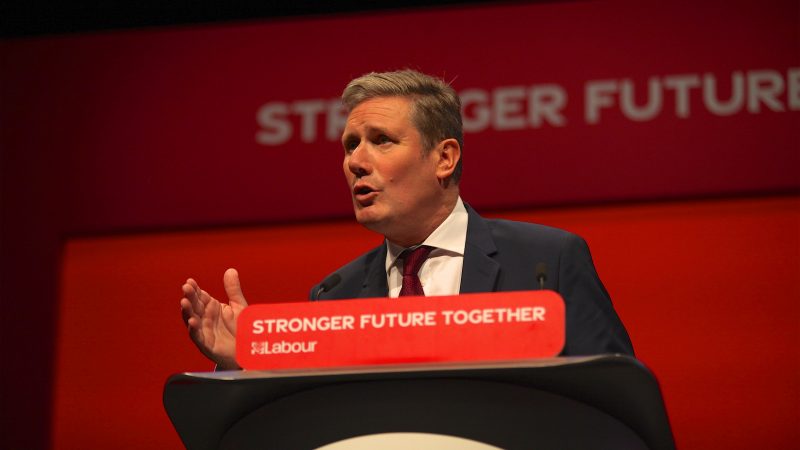
As Labour leaders always do, Keir Starmer faces two audiences at Labour’s conference in Liverpool: the one that’s here or at least represented – members and affiliated trade unions – and the one that’s not, the voters. The voters will barely notice the conference but will gain an impression through a few short snatches of film and much commentary by the assembled media. And party managers are there, in good old ‘New Labour’ style, to ensure that voters don’t see too much of what members and affiliates think or say.
This week, Keir has a very tough task. The public are in general not persuaded by or about him: YouGov trackers show that twice as many think he’s performing badly as leader than think he performs well. Yet, by around 10%, the party is clear favourite to win anyway. Unless he delivers this week, he risks dragging the party down despite Liz Truss’s own failure to impress voters. He has to step up – or he may at some time have to step down.
When Keir Starmer launched his leadership campaign in Manchester, three years ago, he highlighted the problem of disunity, promising that he would unite the party and end factionalism. He has instead fought a running battle against the left – through factionally-motivated rule changes, removing candidates from shortlists and continuous interference by party staff in local parties and council Labour groups.
Factionalism hasn’t gone, it has been brought in house by the leader’s office. The kind of political management developed under ‘New Labour’ and described by Labour historian Lewis Minkin in The Blair Supremacy as “a rolling managerial coup” is back with a vengeance. Some political management is necessary, to protect the party’s interests, conduct heated argument away from the public gaze or reduce conflict – it happened under Jeremy Corbyn’s leadership. But it should not be conducted to crush one point of view, undermine democratic process or the rights of members and affiliates for factional reasons.
Individual or groups of members of the party affected this way legitimate complaint. But affiliated members have cause for complaint too. Keir Starmer made much of his record of solidarity with workers and trade unions in his brilliant leadership campaign launch video. Now he has refused to demonstrate solidarity with trade unions in their struggle to combat the impoverishment of their members through Covid, outsourcing and the cost-of-living crisis. Is it surprising this is seen as an insult to organisations that founded the party, funded it and provided its leaders with organisational stability for 120 years?
MPs being on picket lines is nothing new. Shirley Williams, a member of APEX (now part of the GMB), did not only attend a picket line at Grunwick when she was Secretary of State for Education, she was arrested at it. She remained in Harold Wilson’s cabinet. Solidarity was not a problem!
Keir Starmer was right to say in January 2020 that “we cannot fight the Tories if we are fighting each other”. Disunity was damaging under Corbyn and it is damaging under Starmer. Those of us who don’t have the leader we voted for but stay in the party because a Labour government is always better than a Tory one also have an obligation: to find a way of tolerating and cooperating with those fellow members with whom we disagree. We do it in our trade unions. We used to see ourselves as a single movement with two wings – political and industrial. We must do so again ,left and right.
Unity cannot be imposed from above but it can be nurtured, built through a commitment to shared objectives, with a strategy and programme we all believe in and had an opportunity to help shape. Sometimes, perhaps, we should use a conflict resolution process where divisions have become unmanageable. But if we don’t believe in our strategy and programme, how can we persuade the public to do so?
We have to explain how we will confront the mammoth challenges we face – the cost-of-living crisis, climate emergency and the threat of nuclear war. As in the pandemic, there is widespread recognition that this will require large scale state intervention. Using attacks on the left to project an image of a strong leader will not work – it will just prolong disunity. If party rules are broken, a disputes process that respects the rights of members and the principles of natural justice is what is needed.
Keir Starmer’s apparent choice of Tony Blair as his role model for his top-down approach to leadership also seems surprising. A leader who may have won three elections but also took Britain into a disastrous war (that Keir opposed). A leader who did that before exhausting peaceful options, who deliberately exaggerated the threat posed by Saddam Hussein who posed no imminent threat.
A safer and wiser model may have been that of the four election winning Harold Wilson, who benefitted from a more collaborative approach in shadow cabinet, in the parliamentary and in the wider party. Rigorous debate, proper scrutiny and constructive criticism always makes for better decisions. Perhaps the best indicator of the success of the collaborative approach was the competition to succeed him between James Callaghan, Michael Foot, Roy Jenkins, Tony Benn, Denis Healey and Anthony Crosland. All were in his cabinet, all arguing their corner, and all giants in comparison with most modern politicians. Gordon Brown’s coronation did him no favours!
Let’s hope Keir Starmer does step up to the challenge he gave himself two years ago. Build unity from below – and from a broad base – or we may all face the consequence.




More from LabourList
A gory night for Labour
‘SEND reforms are a crucial test of the opportunity mission’
Delivering in Government: your weekly round up of good news Labour stories